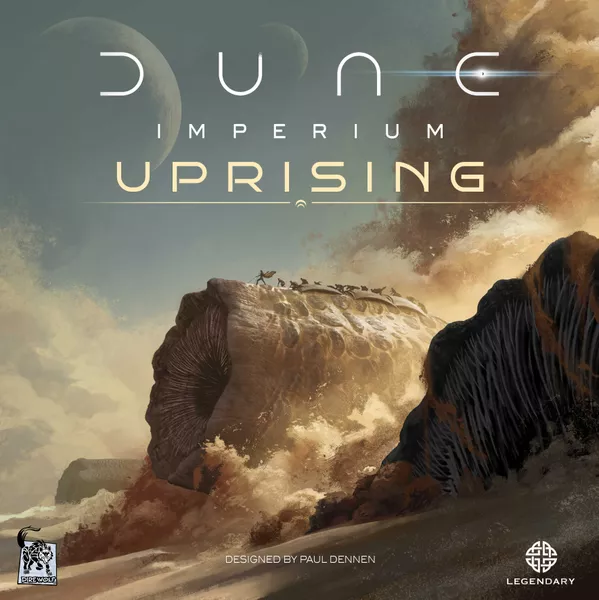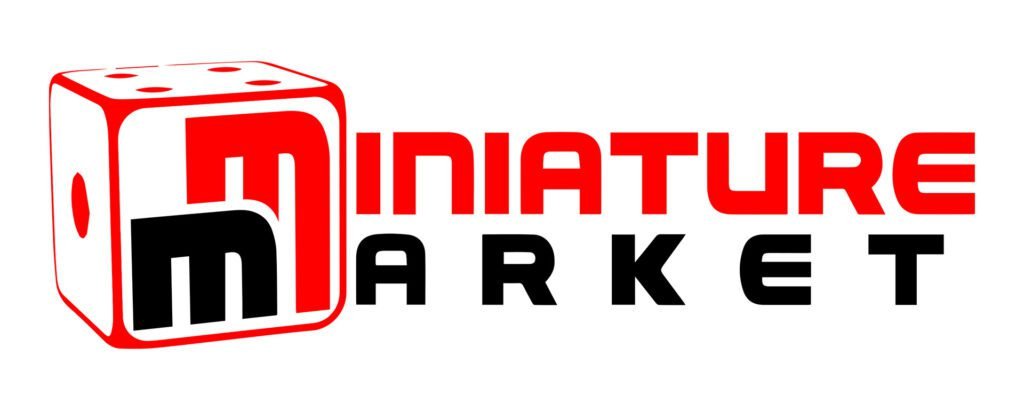
Today we’re diving into Dune: Imperium – Uprising. This is a standalone sequel to the critically acclaimed Dune: Imperium, set in the expansive universe of Frank Herbert’s Dune. So, let’s break it down—what it is, what’s good, what’s bad, & if you should pick it up. Let’s get into it.

What It Is
Dune: Imperium – Uprising is a board game that combines deck-building with worker placement, designed by Paul Dennen. It’s a standalone expansion for 1-6 players, & each session typically takes around 60-120 minutes. Players compete to reach 10 victory points by using strategy, politics, & the ever-present threat of conflict to dominate the planet Arrakis.
This iteration builds on the foundation of Dune: Imperium, refining core mechanics & introducing new elements like spies, sandworms, & an optional CHOAM Contracts module. The game offers a familiar yet fresh experience for veterans of the original, with added complexity that appeals to both newcomers & long-time fans of the Dune universe.
Check Out These Recent Board Game Sales
- Board Game Sale: Disney Villainous 25% Off!
- Board Game Sale: Marvel: Crisis Protocol Core Set 30% Off!
- Board Game Sale: 7 Wonders Available for 17% Off!
Gameplay Overview
The game board in Dune: Imperium – Uprising represents key locations & factions on Dune, where players use their leader’s unique abilities & personal decks of cards to send agents. By placing agents, they gain resources, recruit troops, & form alliances with factions. The board also includes spaces for Alliance tokens, the Shield Wall, & tracks for combat & scoring, all central to controlling the planet & achieving victory.
Setting up the game involves arranging the board, shuffling Conflict, Intrigue, & Imperium decks, & distributing resources. Players choose a leader, receive a starting deck of cards, & gather their personal components, including agents, troops, & markers for scoring. Once the setup is complete, the game is played over a series of rounds, each offering critical decisions.
Each round consists of five phases, beginning with the Round Start phase, where a new Conflict card is revealed & players draw their hands. In the Player Turns phase, players alternate taking turns by either deploying agents to the board or revealing their hands to activate the effects of their cards, which is the core of gameplay.
During an agent turn, players select a card from their hand & place an agent on the corresponding space on the board. Both the card & the chosen location provide benefits like resources, troops, drawing more cards, or advancing on the Alliance tracks. Players must strategically decide where to place their agents to outmaneuver opponents.
Combat spaces are pivotal in preparing for the Conflict phase, as they allow players to send troops to the conflict area. The Conflict card revealed earlier dictates the rewards for battle, & players who commit troops to these spaces compete for valuable resources & bonuses. Other board spaces offer benefits like gaining Intrigue cards or removing weak cards from your deck.
Intrigue cards, which come in three types—Plot, Combat, & Endgame—add a layer of tactical depth. Plot cards can be played during your turn for immediate effects, Combat cards assist during battles, & Endgame cards score at the conclusion. Managing these cards alongside your deck-building choices is crucial to gaining an edge in the game.
Players must also manage essential resources: Spice, Solari, & Water. Spice is the most valuable resource, while Solari functions as currency, & Water is necessary for sustaining certain actions. Efficient resource management is vital to perform key actions & sustain dominance over Dune.
Victory points are tracked on the game board, with the aim of having the highest score by the end. Points are likely earned through combat victories, advancements in alliances, & possibly from Endgame Intrigue cards. The game also features optional modules like the CH module & special solo & two-player rules, adding further replayability & strategic depth.

The Components
Visually, Dune: Imperium – Uprising impresses with its high-quality components. The board has been redesigned with tighter, more balanced spaces, creating a more focused game. The artwork reflects the harsh, unforgiving environment of Arrakis, while the cards & miniatures are detailed & thematic.
The modular board introduces a CHOAM Contracts module, which adds variety to each session by encouraging players to diversify their strategies. Whether it’s the sandworm tokens, faction icons, or the spy mechanics, every piece feels deliberate & polished, enhancing the overall immersion in the Dune universe.
The Good
First off, the added depth to both deck-building & worker placement mechanics really shines in Uprising. The game feels more dynamic with the emphasis on card draw & effects, which address some of the criticisms of the original. The spy mechanic adds a layer of intrigue & flexibility that wasn’t present in the base game, giving you more options when your opponents block key spaces. Sandworms, too, are a brilliant addition, introducing high-risk, high-reward opportunities that tie directly into the thematic elements of Dune.
Another highlight is how the game balances complexity & accessibility. Uprising feels like a natural progression from the original, but it’s not overwhelming. New mechanics like CHOAM Contracts & conflict card sets add layers of strategy without bogging down the gameplay. Additionally, the solo mode has been updated to offer a more challenging experience, with rival players scaling based on their influence levels. For those who prefer cooperative gameplay, the new six-player team mode is a fantastic addition, offering a more collaborative, extended experience.
The Bad
While Uprising offers plenty of new content & refinement, it doesn’t entirely replace the original game, which may leave some players questioning whether they need both versions. The added mechanics, while enriching, also make the game slightly more complex, which could be daunting for more casual gamers or those new to Dune: Imperium. If you found the original to already offer a deep experience, the extra layers here might feel unnecessary unless you’re a frequent player.
Another issue lies in the pacing, especially in larger player counts. The six-player team mode, while a fun twist, significantly extends the game length. Some might find it overstays its welcome, particularly if you’re looking for a quicker session. Additionally, the introduction of sandworms & spies, while thematic, might feel gimmicky or overwhelming to players who prefer straightforward strategy over added tactical elements.
The Verdict
So, should you buy Dune: Imperium – Uprising? If you’re a fan of the original game or the Dune universe, this is an easy recommendation. The refined mechanics, additional layers of strategy, & thematic depth make Uprising feel like a fresh take on a proven formula. Sandworms, spies, & the CHOAM Contracts module all bring exciting new twists that enhance replayability & strategic depth.
For those new to the series, Uprising is arguably the better starting point, offering a more polished & complete experience than the original. However, if you already own Dune: Imperium & are content with it, Uprising might not feel essential unless you crave more variety or are an avid fan of the theme. The decision to pick it up ultimately depends on how much you enjoy strategic deck-building & worker placement, & how often you think you’ll play.

Final Thoughts
If you’re wondering whether to get Dune: Imperium – Uprising or stick with the original, it really comes down to how much you play the game & how invested you are in the Dune universe. Having played both, I feel that Uprising improves upon the original in a lot of subtle, yet meaningful ways. The tweaks they’ve made address some of the minor balance issues people had with the first game, & the new mechanics, like spies & sandworms, add layers of strategic depth that make this version feel fresh & more dynamic.
One of the biggest changes that really stood out to me was how much more engaging the green area of the board becomes later in the game. In the original, some spaces would get neglected as the game progressed, but Uprising fixes that with more balanced incentives, so every corner of the board stays relevant. I also appreciate the addition of spies, which adds more flexibility & opens up spaces that would’ve been locked down in the original. The changes to the conflict cards & the introduction of sandworms bring a more tactical feel to combat as well, which is a nice upgrade.
The game doesn’t feel like a total reinvention, though—more like a polished version with some clever patches. It’s clear the designers listened to player feedback & made improvements where it counts. It’s not that the original was broken, but Uprising is just a bit more balanced & streamlined, especially when it comes to certain strategies that may have felt overpowered before. If you’re someone who already owns the first game & plays it regularly, this upgrade is worth looking into, but maybe try it out first to see if it’s what you’re looking for.
For solo players, Uprising also makes some nice adjustments. The solo mode feels more dynamic, with the rival players’ actions scaling up in intensity depending on their progress, which keeps you on your toes. If you’re like me & enjoy solo gaming, you’ll probably find the tweaks here to be a noticeable improvement. & for those of you looking for more group options, the addition of six-player team mode is a cool extra, although it’s something I’d need more time with to fully explore its impact.
Now, if you’re new to Dune: Imperium & deciding between this & the original, I’d recommend jumping straight into Uprising. It offers a more refined experience right out of the box, with a little extra complexity, but nothing that would overwhelm someone familiar with strategy games. The core mechanics are still accessible, & the improvements give it a bit more longevity.
Ultimately, if you play Dune: Imperium often, I think Uprising is worth it. It feels like a more complete game, & while the original still holds up, this one just flows better & keeps you more engaged throughout. If you only pull it off the shelf once a year, though, sticking with the base game is probably enough. Either way, if you love the Dune universe & enjoy a solid deck-building, worker-placement hybrid, Uprising is definitely a game you should consider.
Purchase Options


At no extra cost to you, The Board Game Site may receive revenue from affiliate and advertising partnerships for sharing this content and from purchases through links.








